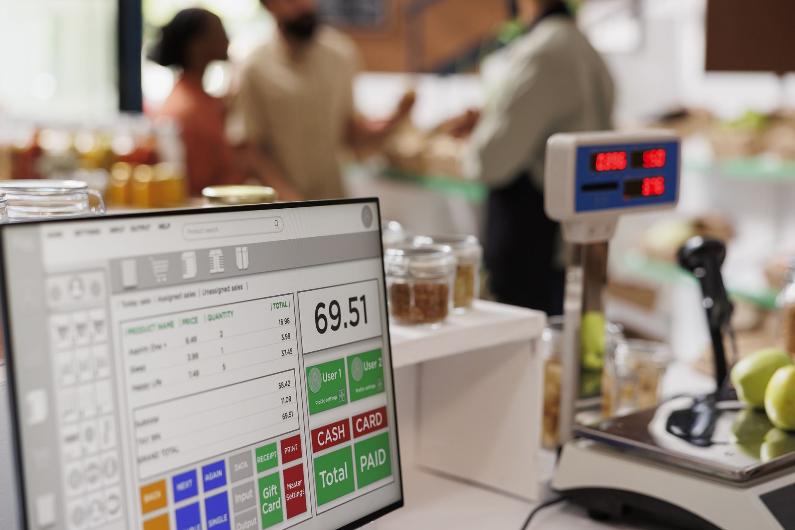Confused about juggling between managing inventory and sales at the same time? In retail business, the ability to multitask is needed as working in a fast-paced environment will help your business to strive.
But this is not an easy feat to pull. Trying to figure it out by yourself can be disastrous. That’s why an Enterprise Resource Planning (ERP) platform is going to be your lifesaver.
The thing is, using ERP platforms also comes with challenges such as strategic challenges, technical challenges, and operational challenges.
Sounds familiar? Let's dig into more detail on these challenges that stores face when retailers start using an ERP platform and figure out how to tackle them!
What is ERP?
An ERP platform is a suite of customizable applications that enables you as a retailer to integrate and manage all major business processes in the retail industry. It provides quick, simple, and reliable management solutions needed to run businesses more efficiently.
Rest assured, the ERP platform provides real-time information. You can see what's happening in your retail store right now, instead of waiting for reports to come in. It’s also able to bring all your different sales channels together, from online stores, physical stores, and any other sales channels your retail business has from a single platform.
Using an ERP platform in retail helps to control the inventory better. You can see exactly how much stock you have, where it is, and when you need to reorder. Say goodbye to stockouts and overstocking, which can both be costly.
Now that we’ve covered the brief overview of ERP, let’s find out what the challenges are in using the ERP platform in retail business.
Challenges for retail business
1. Strategic Challenges
The first challenge of ERP platform implementation in your retail business is strategic challenges. This includes getting support from top management, allocating resources correctly, and handling changes in the management effectively.

1.1. Top Management Support
Gaining the support of top management is a key factor in the successful implementation of an ERP platform in the retail business. How do we gain the expected support?
- Showing how your goals for using an ERP platform align with the company's bottom line and how the proposed changes will be funded.
- Executing organizational plans well with middle management to define information from top management and inspiring lower management to perform improvement.
- Providing clear expectations and guidance to lower-level managers can help in achieving the support of top management.
1.2. Resource Allocation
Implementing an ERP platform can face a challenge in how to allocate the necessary resources to make it work. This may lead to continuous problems, like delays, increased costs, and overworked employees.
Don't worry, there's a light at the end of the tunnel! If you can successfully implement an ERP platform, it is possible to lead to all sorts of benefits, like improved efficiency, productivity, and profitability.
How to anticipate?
Firstly you can create a proper ERP platform implementation plan. When it’s done, communicate the plan effectively throughout the organization. Last but not least, make sure you have a solid resource allocation plan in place.
1.3. Effective Change Management
Using an ERP platform in the retail business may create effective change management. How to achieve ERP implementation success in the retail business?
- Gaining key stakeholder buy-in
- Maintaining stakeholder engagement
- Prioritizing stakeholder engagement
- Tailoring messages based on the audience
- Assessing the impact of the change
2. Technical Challenges
Once ERP platform implementation in your retail business has started, don’t be shocked to find some technical challenges like how to migrate the data, how to customize ERP usage based on your business needs, figure out the way to test it, and do a comprehensive post-implementation. Don’t worry, we got it covered!

2.1. Data Migration and Integration
Migrating vast amounts of data from legacy systems to a new ERP platform needs to be accurate. This process can be complex, especially for retailers who are new to the ERP platform. Need some tips? Go follow these steps:
- Determine which data needs to be sorted and moved, including products, vendors, customers, transactional data, point-of-sale information, and invoices.
- Highlight specific data types and ensure accurate loading into the new platform.
- Engage in proper planning before migrating the data.
- Create effective communication within the team to avoid mismatched data.
- Build a strong partnership with the ERP vendor to receive full assistance.
2.2. Customization and Integration
In the retail business, customization may be necessary to ensure the ERP fits the business needs. At the same time, this can increase complexity and make it challenging to implement without disrupting the system. What can you do?
You can try to balance system customization with standardization. But you have to remember that it needs to be done thoroughly. Be careful when you navigate this balance, to ensure that the ERP platform meets their specific requirements.
At last, when everything has been customized and integrated keep in mind to do proper maintenance. Maintaining the benefits of standardization will help you to ease the maintenance process and create seamless integration with other systems.
2.3 Testing and Quality Assurance
You might already know that the ERP platform is customizable to suit the unique requirements of your business, right? But the thing is, over-customization can lead to complexity and increased maintenance efforts. Try these few steps as anticipation:
- Create a comprehensive planning
- Define specific clear goals and timelines
- Be careful with data mapping and its transformation
2.4 Post-Implementation Support
Congratulations, the ERP platform has been implemented in your retail business! After the initial implementation, retail businesses need ongoing assistance to ensure the smooth functioning of the ERP platform. Not sure how to do that? Feel free to follow these tips:
- Choose an ERP vendor that offers reliable post-implementation support
- Invest in comprehensive training programs to ensure smooth user adoption
- Create an open communication with employees and stakeholders about the support process
3. Operational Challenges
When you’re in the retail business, doing an end-to-end operational process is a key point to measure success. This is why you will face operational challenges while implementing the ERP platform. Find out the tricks in this section and you’ll survive!

3.1 User Adoption and Training
Training employees to use a new ERP platform is challenging. Try the several strategies as follows to anticipate:
- Provide personalized training modules tailored to each employee’s roles and needs.
- Hands-on workshops and training champions.
- Involve top management and leadership in the training process to motivate employees.
- Integrating change management with the training module.
- Providing clear communication about the benefits of the ERP platform.
- Obtaining user feedback through surveys after training sessions are completed.
3.2 Disruption to Operations
Implementing an ERP platform in your retail business may lead to issues in minimizing disruptions during the implementation phase. Here’s how to handle it:
- Plan for potential downtime and have contingency measures in place to minimize the impact on sales, customer service, and supply chain processes.
- Open communication with employees and stakeholders about the implementation timeline and expected disruptions to mitigate the impact.
- Conduct a thorough cost-benefit analysis and seek cost-saving opportunities.
- Create proper planning, effective communication, and a strong partnership with the ERP vendor.
3.3 Working Out Process Integration
Working out process integration and identifying processes to integrate ERP platforms in retail business is tricky. There are certain ways to get through this challenge. The first is to assess the specific retail business needs carefully.
Next, you have to establish a realistic budget for ERP implementation. It is also important to choose a solution that can adapt and grow with your retail business. Then you can prioritize seamless integration with online sales platforms.
As retail business owners, keep in mind to select an ERP platform that effectively manages online orders, inventory, and customer data. This choice will help your business grow better with the usage of ERP.
3.4 Inadequate Flexibility
If your retail business is just starting to implement an ERP platform, it may create inadequate flexibility that leads to rigidity in the system. Check out some tips that you can try:
- Address the issue of customization and complexity in detail.
- Maintain retail operations' unique processes and workflows, even with the existence of a new ERP platform that aligns with these complexities.
- Create careful planning and collaboration between your team and the ERP vendor to balance customization, functionality, and flexibility.
3.5 Employee’s Resistance to Change
As a retail business owner, you may find it difficult to handle employee’s resistance to change. It includes a change of working system, like using an ERP platform. Here, we bring the answer to your question.
You can invest in comprehensive training programs that help employees understand the new system and how it will benefit them. It means the training will involve end-users in the decision-making process and demonstrate the ERP's benefits to encourage enthusiastic user adoption.
Another thing that you can do is to create an open communication flow where employees and stakeholders are informed about the implementation timeline and expected disruptions. This will be helpful to win employees’ aspirations and reduce the resistance to change.
3.6 Not Properly Vetting Vendors
Selecting the right ERP vendor for your business is not that easy. But it can be achieved by implementing the following strategies:
- Gather the right requirements and enable project management to ensure that the organization is focusing on the right things as they vet each platform.
- Seek external and objective help to guide the process and ensure the focus is on the right aspects of each platform.
- Implement proven tactics to guard the company against risks and pitfalls that come with the software selection process
- Ask the ERP vendors the right questions, such as inquiring about their experience, customer references, industry knowledge, and implementation team.
3.7 Maintenance Cost
Everything in terms of business improvement is highly related to cost, including maintenance. It goes the same with implementing ERP platforms in your retail business. Ways to overcome this challenge:
First, address important points such as vendor support, impact assessment, data migration, monitoring, scalability, and security considerations. By prioritizing these points, you can minimize disruptions and maximize the benefits of the ERP platform.
Next, the ERP platform can help solve maintenance challenges by providing ongoing patches, maintenance, and promotions on software options throughout the year. It’s helpful to reduce operation and capital expenses. With this, your team can focus on value-adding tasks like innovation or development.
3.8 Lack of Understanding
Last but not least, there will be a lack of understanding when your team is new to the ERP platform. Here are some tips for you:
- Conduct a thorough assessment of the business's needs and technology environment.
- Create a well-defined planning phase to ensure that the ERP platform is aligned with the company's specific requirements.
- Invest in comprehensive training programs and change management strategies to ensure smooth user adoption and avoid resistance.
- Engage with vendor references and get to know in-depth vendor assessments.
- Choose the right ERP vendor that prioritizes security, compliance, and support can contribute to the long-term success of the ERP implementation.
There you have it! When it comes to bringing an ERP platform into the retail world, it's indeed full of challenges. From dealing with the nitty-gritty details of customization to making sure everything is super secure and compliant, and even thinking about the future.
There's a lot to consider.
But don’t worry, with some careful planning and talking to the right people, the payoff can be huge. We're talking about smoother processes, better data, and some seriously game-changing insights. Sure, there will be bumps along the way, but with the right approach, an ERP platform can take your retail game to a whole new level.
If you’re looking for an ERP platform to try, Odoo might be the one for you! Odoo is suitable for your every retail business streamlines. Care to find out more about Odoo? Reach out to the Portcities team and we will definitely help you through.
Click here to be contacted by our team. Pleasure to assist with your needs!